You probably use has and have often, but do you know the grammar rules behind how you use them?
Take this pair of sentences: which one is correct?
Is it, “Peter have a dog” or “Peter has a dog”?
If you’re not using a third person pronoun, like he, she, or it, or a name, you can almost always use "have." Keep reading for the exceptions.We’ll use the tips in this article to find out the answer and learn when to use has vs. have.
What Is the Difference Between Have and Has?
The words "has" and "have" both come from the verb "to have."
To have means to possess or hold something. It also means to experience or undergo something. "Has" and "have" both mean the same thing as "to have."
So why are there two different versions of the word?
When Should I Use Have or Has?
It’s all to do with who we are talking about. Whether you use have or has depends on the point of view you are using. Luckily, you only use has when talking in the third-person singular (that’s grammar jargon for using he, she, or it in a sentence).
If you’re not using he, she, or it, you can almost always use "have." Keep reading for the exceptions.
First, let’s look at some examples of when to use has and have.
When Do I Use Have?
We use have when talking about ourselves in the first person perspective (using I), when addressing someone else directly in the second person perspective (using you), or when referring to multiple people in the third person plural (using they).
Here are some examples:
- I have a dog.
- You have a cat.
- They have horses.
In all three of the examples above, have is used to indicate ownership.
Now take a look at these:
- I have seen that movie.
- You have been there, right?
- They have worked hard on this project.
In these examples, have is used to show that the subject of the sentence (I, you, they) has been through an experience (seeing the movie, going to a place, working on a project).
To recap: If you’re using I, we, you, or they, use have.
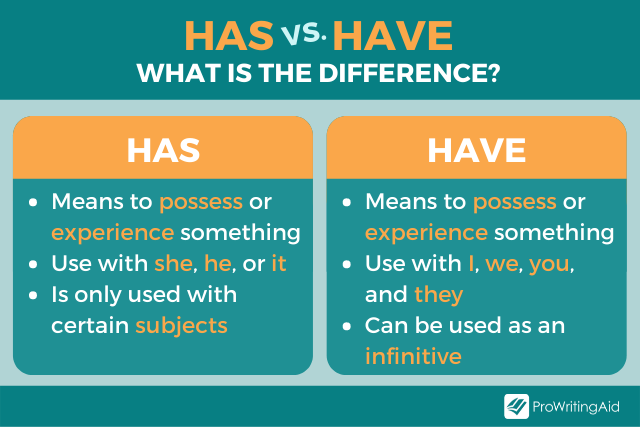
When Do I Use Has?
We use has when talking about someone or something else in the third person singular. That means that if you’re referring to just one person or thing, and you’re not using "I" or "you" to refer to them, you need to use has.
Here are some examples:
- She has red hair.
- He has eight siblings.
- It has many special features.
As before, in all of those examples has indicates ownership.
Now take a look at these:
- She has been to school.
- He has learned how to crochet.
- It has fallen over.
In these examples, has shows that the subject (she, he, or it) have experienced something (been to school) or undergone a change (learned to crochet, fallen over).
Is It "The Team Has" or "The Team Have"?
If you’re using a collective term, like family, team, company, or group, you can use has or have. This is because we can view these terms as one single group, or as a collection of individuals.
- The team has achieved record results this year. (team = single group)
- The team have achieved record results this year. (team = collection of individuals)
Do I Use Has or Have with a Name?
When you refer to an individual by name, you’re using the third person singular—that means you use has.
That’s because names take the place of "he" or "she" (or any other singular pronoun, like the non-binary pronoun, "they") in a sentence.
- He has a dog.
- Peter has a dog.
Now we have the answer to our earlier question. It’s Peter has a dog, not Peter have a dog.
Is It "She Should Have" or "She Should Has"?
It’s she should have. Even though we are using she, which usually goes with has, the verb should has special rules.
That’s because it’s a modal verb. We won't get into those here, but you should know that if you always use have after a modal verb.
Here are the verbs to look out for:
- Would: I would have gone, but I was held up at work.
- Could: You could have saved him.
- Should: She should have asked me before she sold my bike.
- Shall: You shall have what you are given.
- Will: I will have the risotto, please.
- Might: He might have told me; I can’t remember.
- May: They may have been right about that.
- Can: You can have whatever you want.
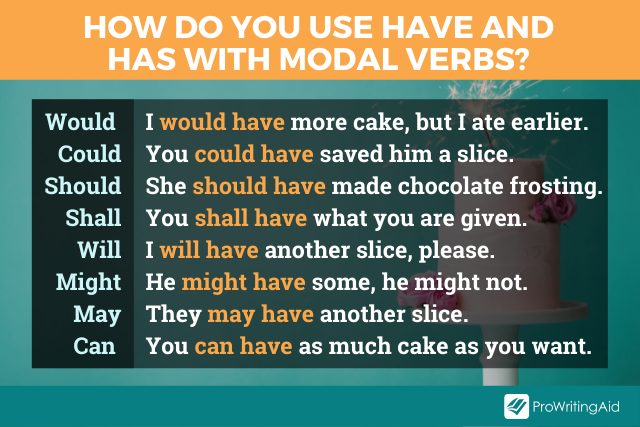
What Tense Are Have and Has?
We can use the words have and has to make a few different tenses. This can get a bit complicated, but we’ll start simple.
If you are speaking about someone owning something in the present tense, you’ll use have or has with the same rules as before:
- She has an ice cream.
- I have tickets to the concert.
- They have coconut cream pie on the menu.
This is known as the simple present tense.
If you want to say that someone owned something in the past (but not necessarily now), use had. Had is the past tense version of have/has:
- He had lots of jewellery.
- You had an olive tree at the old house.
- They had excellent WiFi at the hotel.
This is known as the simple past tense.
You can also use has, have, and had to create more complex tenses.
If you want to refer to something that started in the past and continues into the present, use have or has with the same rules as before plus an -ing verb:
- She has always loved running.
- I have been going to ballet class since I was five.
When Do You Use "Was Having" or "Had Been Having"?
If someone began owning or experiencing something in the past, and this was still happening when another event occurred, use was / were having, like this:
- I was having breakfast when he got home.
- John was having a nightmare when he woke up.
- Don’t blame yourself. You were having a terrible time at work already when it happened.
If you want to describe a continuing experience that occurred before a particular time in the past, use had been having:
- I had been having trouble with my car already when I set off on the journey.
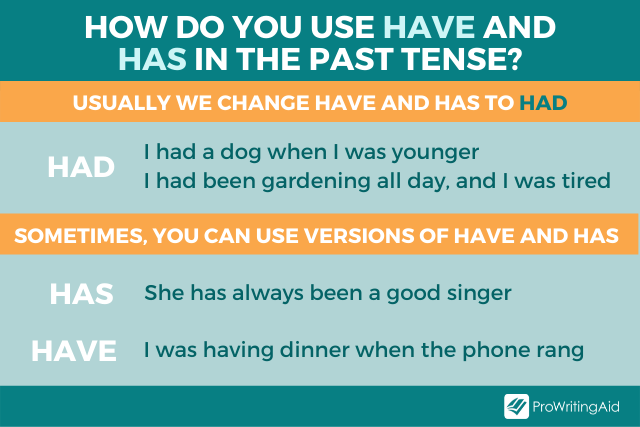
Is It Grammatically Correct to Write "Had Had"?
If you or someone else finished doing something before a specific point, you’ll need to use "had" before the action:
- No wonder you’re hungry. You had finished your lunch before 10am!
- I had seen over 50 horror films by the time I was 13.
- She had run a marathon before, but never as fast as she did this time.
This can look a bit weird if you want to say that you or someone else had finished owning or experiencing something before a point:
- They had had their dinner by 7pm.
- You had had that blanket for years before you lost it.
- I had had my prom dress ready for months before the event.
In all of these examples, it is correct to say "had had."
If you’re worried about using have and has in your sentence, try ProWritingAid. It works anywhere you write, and will let you know if you’ve used the wrong word:
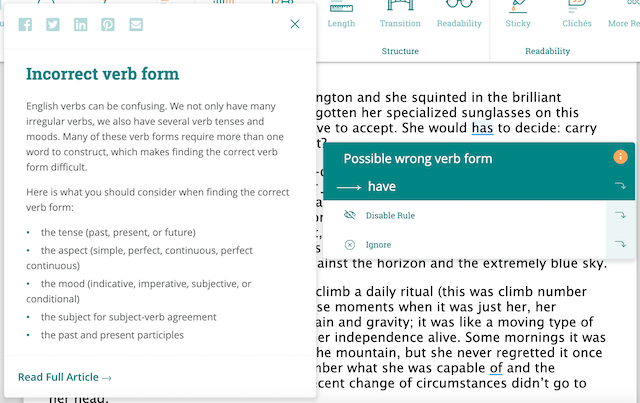
Sign up for a free ProWritingAid account and start writing like a pro.
What Is the Difference Between Have, Has, and Must?
On their own, have and has don’t mean the same thing as must.
However, the phrases have to or has to do mean the same thing as must. You can use have to / has to and must interchangeably, however sometimes must is more compelling.
- You have to do your homework before you go to the skate park.
- You must do your homework before you go to the skate park.
While these sentences technically mean the same thing, using must in the second example sets a more commanding tone—the speaker is telling the listener what they must do.
Here are some more examples of have to and has to in a sentence:
- I have to leave for work by eight.
- You have to listen to this new band!
- She has to learn her lines for the performance.
- Children have to be accompanied by an adult to ride the rollercoaster.
- The Government has to resolve the issue by the end of the week.
- It has to stop raining before we can play football.
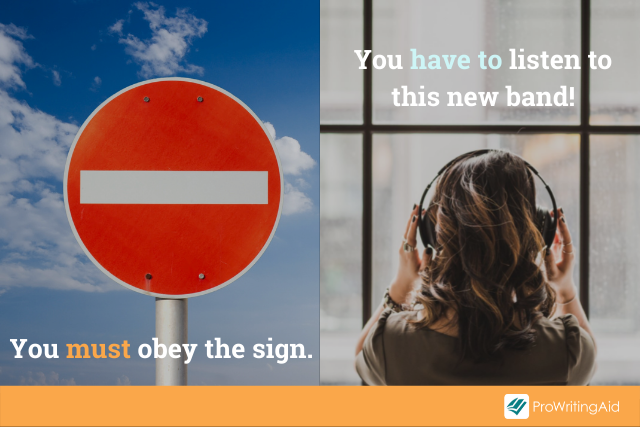
Can I Use Have and Has in the Same Sentence?
Yes, of course! Just use the same rules we’ve already covered.
For example:
- She has red shoes, but I have blue shoes.
- He has seen movies that have not been released yet.
You might also use the phrase "has to have" in your sentence to mean "must have":
- She has to have the correct uniform to attend school.
- Jane is a perfectionist. She has to have everything planned down to the last detail.
What Is the Difference Between Hasn’t and Haven’t?
Hasn’t and haven’t are negative contractions of has and have. They mean "has not" and "have not" respectively.
When you use hasn’t or haven’t, it is usually to say that you have not experienced or undergone something, rather than to say that you do not own something.
Use hasn’t and haven’t with the same rules we covered before. Hasn’t goes with she / he / it and haven’t goes with I / we / you / they.
- We haven’t got any potatoes left in stock.
- The shop hasn’t got any potatoes left in stock.
- I haven’t been able to get any potatoes.
- How will you cook the dish if you haven’t got any potatoes?
Remember, if you can replace the subject of the sentence (the thing doing the having or not having) with it, use hasn’t—like with "the shop" in the example above.
What Are Some Examples of Has or Have in a Sentence?
Let’s finish up with a quick-fire round of some common phrases that use has or have.
Is It "Does Have" or "Does Has"?
It’s does have. This is because the verb to do (which turns into does, did, etc.) requires you to use the root form of any verb you put after it.
This sounds confusing, but all it means is that you need to use "have" after any version of the word "do" :
- Your plan does have its benefits.
- He does have a point.
Is It "Did It Have" or "Did It Has"?
This follows the same pattern as above. "Did" is the past tense version of the word "do," so the answer is did it have.
- Did it have to end this way?
- Did she have a haircut?
- Did the hotel have a swimming pool?
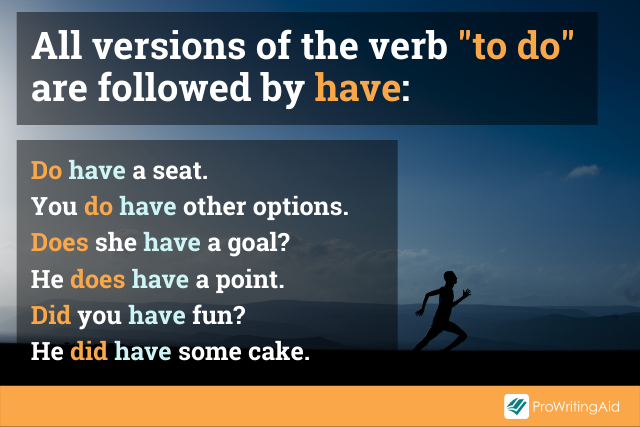
Is It "Someone Have" or "Someone Has"?
Someone is a singular pronoun, like he or she. That means that, in most cases, we use has.
- Someone has poisoned the waterhole!
However, if you’re asking a question beginning with "Does," you need to use have, as above:
- Does someone have time to help me with this?
Is It "Which Have" or "Which Has"?
This depends on the subject of your sentence. Remember, we only use "which" with non-human subjects.
If it is a singular subject, use which has. If it is a plural subject, use which have.
- Plural: Watches, which have always been used to tell the time, now have many other purposes.
- Singular: The bandstand, which has been standing for 100 years, is being demolished this Saturday.
Have You Got It?
Now you know how to use have and has in your sentences. Remember, before you decide which one to use, check your tense and who you’re talking about.


